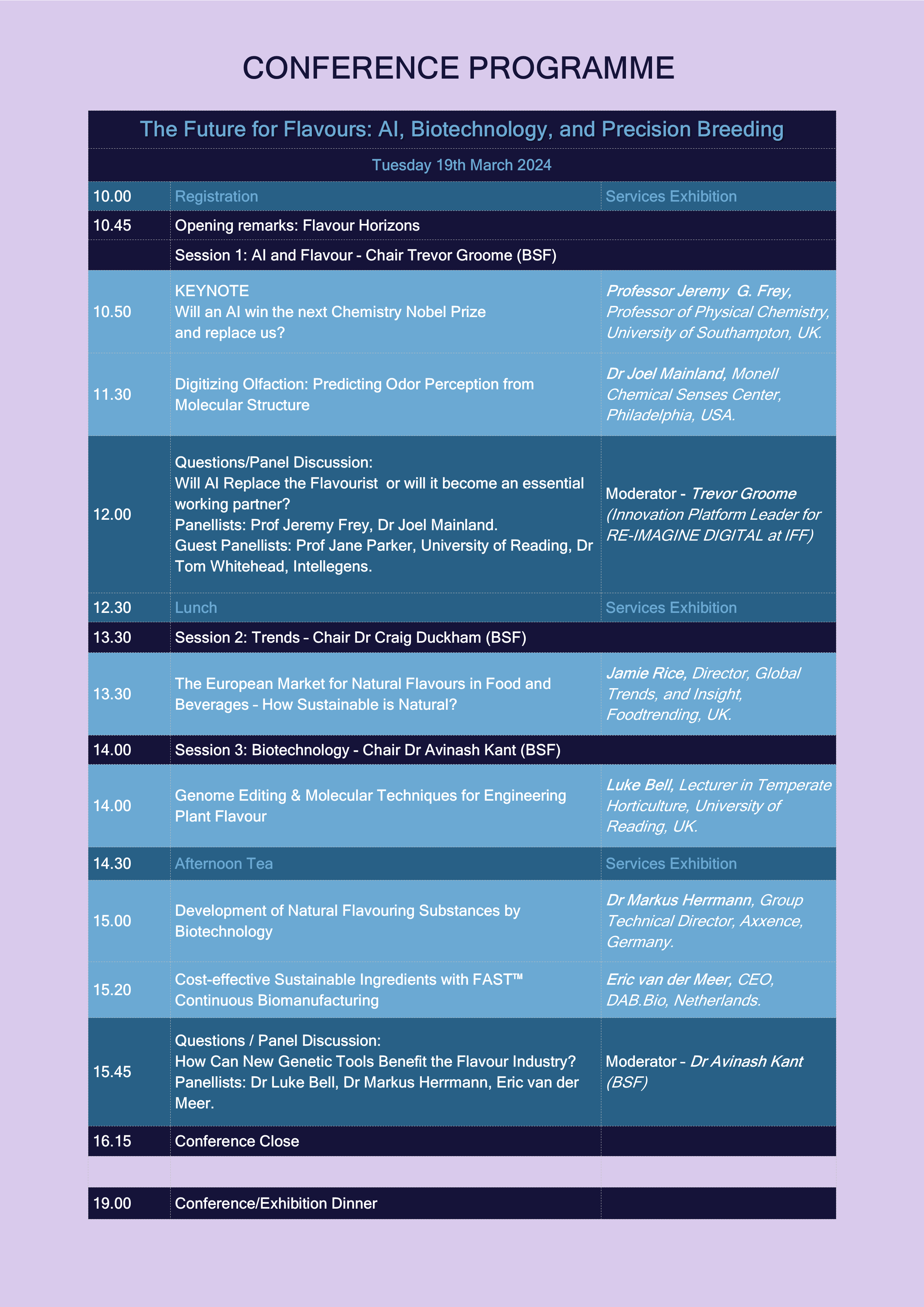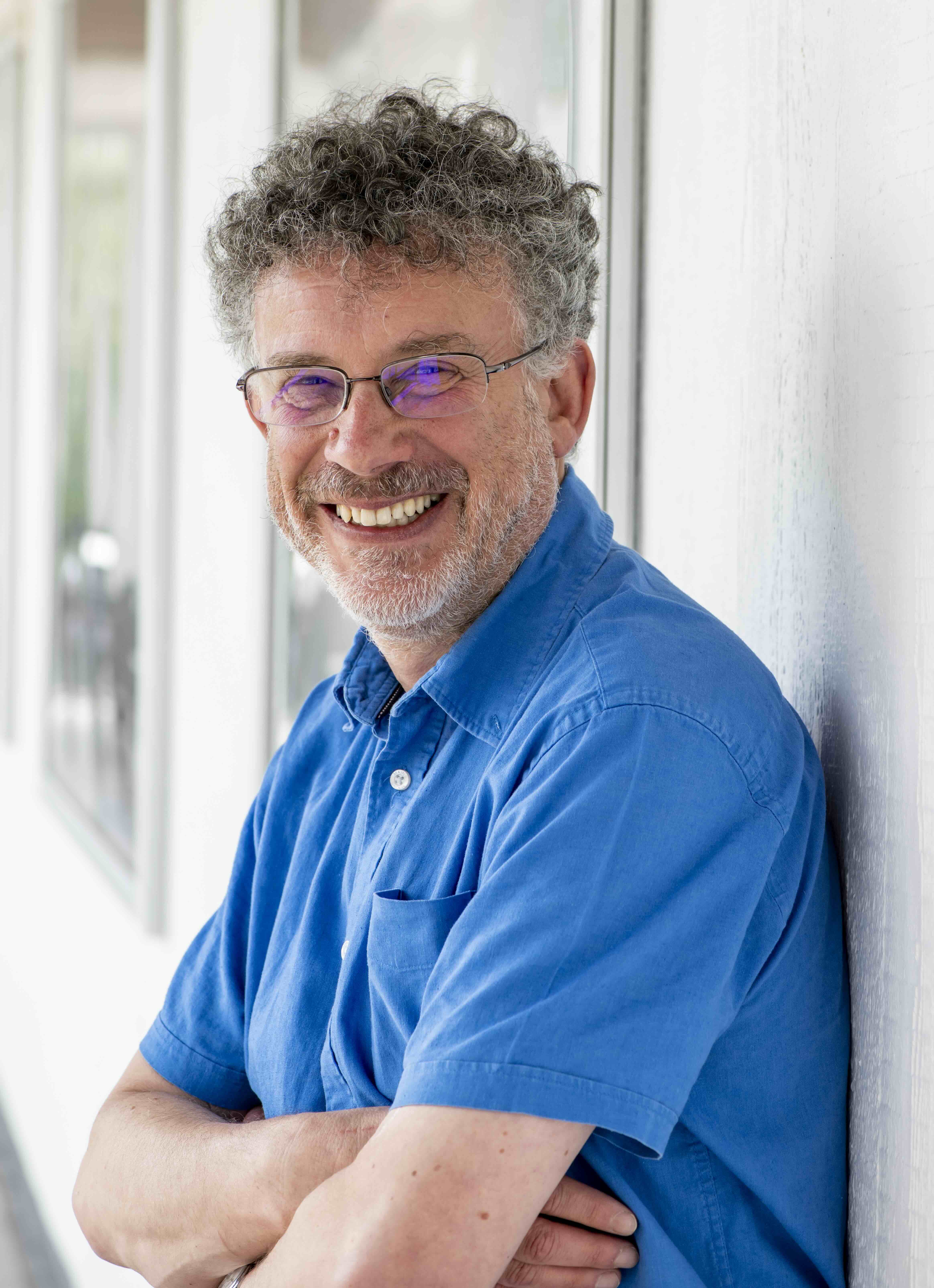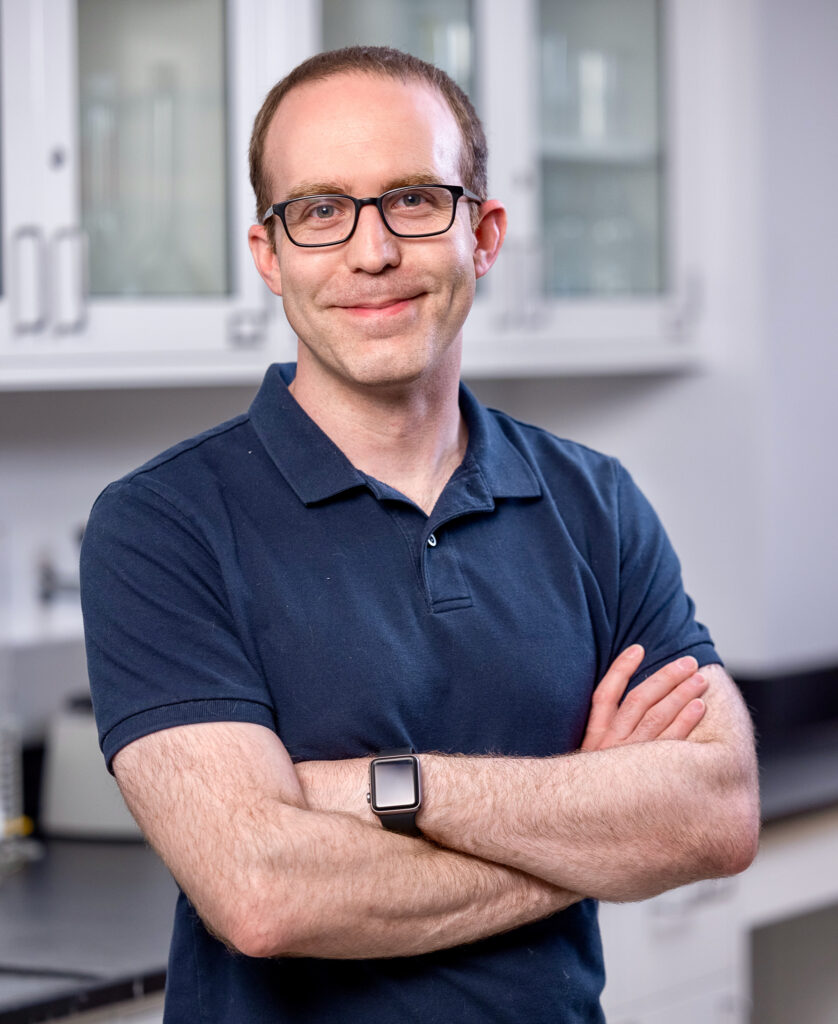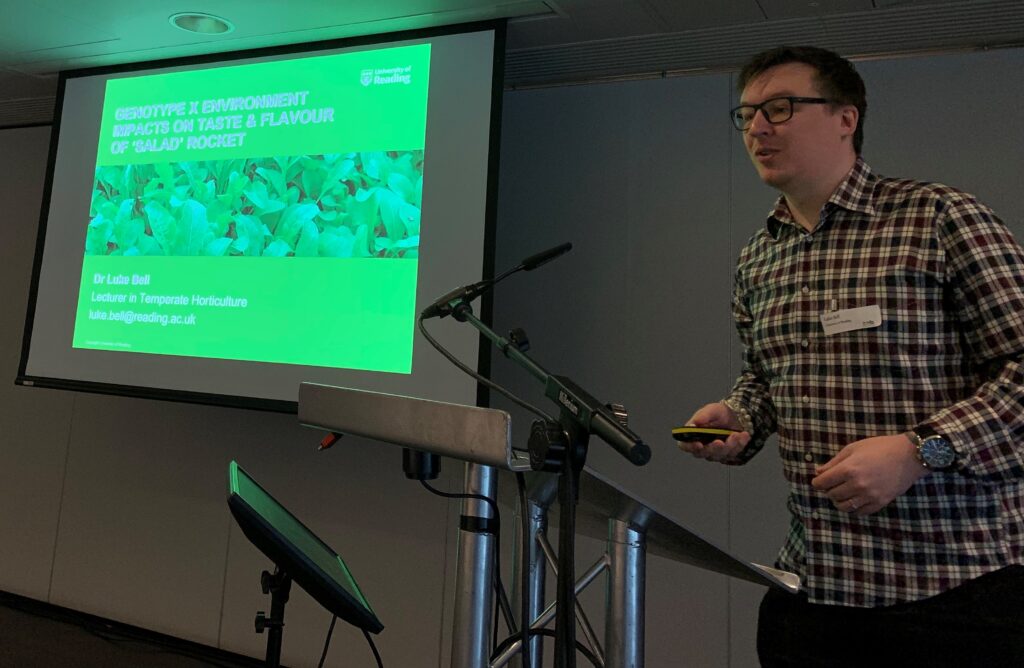FLAVOURTALK 2024 CONFERENCE
Tuesday 19th March 2024
Sponsored by
The Future for Flavours:
AI, Biotechnology, and Precision Breeding
Registration has closed for the FlavourTalk 2024 Conference and Exhibition.
Synopsis
The FlavourTalk Conference provides an opportunity to hear leading speakers at the forefront of flavour innovation and technology discuss topics of key importance to the European flavour market. This year it returns to address: the impact AI will have on the development, supply and application of flavouring substances and extracts; biomanufacturing methods for natural flavouring compounds; market trends; emerging regulatory issues including the use of new breeding technologies for use in crop development.
Speakers and Guest Panellists Include:
Professor Jeremy G. Frey, Professor of Physical Chemistry, University of Southampton, UK. | Dr Joel Mainland of Monell Chemical Senses Center and Adjunct Associate Professor, Department of Neuroscience, University of Pennsylvania, USA. | Professor Jane Parker (guest panellist), Director of the Flavour Centre, University of Reading, UK. | Dr Thomas Whitehead, (guest panellist) Head of Machine Learning, Intellegens, UK. | Jamie Rice, Director at FoodTrending, UK. | Dr Luke Bell, Lecturer in Temperate Horticulture, University of Reading, UK. | Dr Markus Herrmann, Group Technical Director, Axxence, Germany | Eric van der Meer, CEO, DAB.Bio, Netherlands.
The Programme Includes:
We would advise booking early to ensure a place and avoid disappointment.
Who Should Attend
All those involved with the production of raw materials, formulation and creation of flavours, flavourists, flavour technologists, marketing and sales personnel, buyers and all those interested in future trends in the supply of flavour raw materials and technological developments. Technologists and marketeers in food manufacturing companies who want to understand what new flavouring ingredients and technologies are on the horizon for innovative new products.
Registration has closed for the FlavourTalk 2024 Conference and Exhibition.
Speakers and Guest Panellists Include:
Jeremy G. Frey – A Physical and Digital Chemist
Professor of Physical Chemistry,
Head of the Computational Systems Chemistry,
School of Chemistry, University of Southampton, UK.
Title: Will an AI win the next Chemistry Nobel Prize and replace us?
Synopsis
Expert systems, knowledge bases, statistical analysis have long contributed to the advances in Chemistry. The application of Artificial Intelligence (AI) in the form of machine learning (ML) has seen a huge expansion in the last few years. These data driven approaches facilitated by increased computational power, potentially change the whole way we will approach research and teaching in Chemistry. However, these approaches also impose significant demands on the generation of chemical data, including that needed for flavours and fragrances, where like the pharmaceutical industry interaction with human biology makes for a highly complex system. The flavour chemistry infrastructure will need to respond to ensure that the quantities of quality information can be generated in a more automated manner and recorded in ways that enable curation, dissemination and sharing in machine readable ways. Will these AI systems lead to an increase in the type of scientific discovery resulting in the award of a Nobel Prize to an AI?
Biography
Jeremy Frey obtained his DPhil on experimental and theoretical aspects of van der Waals complexes with Prof. Brian Howard (PCL, Oxford), followed by a NATO/SERC fellowship with Yuan T. Lee (Lawrence Berkeley Laboratory). In 1984 Jeremy took up a lectureship at the Southampton, where he is now Professor of Physical Chemistry and Head of the Computational Systems Chemistry Group.
Jeremy’s experimental research uses laser spectroscopy probes molecular organization from single molecules to liquid interfaces. In parallel he investigates how e-Science enables smart and intelligent laboratories, where people, equipment and computers can all work productively and smoothly together. This blends into his computational research on chemical informatics and the application of novel mathematical approaches to chemical modelling.
Jeremy is an enthusiastic supporter of storytelling in interdisciplinary research, combining theory, computation and experiment addressing the wider digital economy. He led several Digital Economy projects, including “The IT as a Utility Network” (in which he worked with the Food Standards Agency), “The Internet of Food Things Network” and the “UK Network on Artificial and Augmented Intelligence for Automated Scientific Discovery”,
Jeremy is the co-founder of Data Revival a company that specialises in transforming old paper based chemical records into a form suitable for building AI models.
Dr Joel Mainland
Monell Chemical Senses Center and Adjunct Associate Professor,
Department of Neuroscience,
University of Pennsylvania, USA.
Title: Digitizing Olfaction: Predicting Odor Perception from Molecular Structure
Synopsis:
If you have a modern phone, you can capture a visual scene as a photograph, alter it, send it to a relative in another country in an instant, and store it so you can look at it for years to come. None of this is currently possible in olfaction. In vision and audition, we know how to map physical properties to perception: wavelength translates into colour and frequency translates into pitch. By contrast, the mapping from chemical structure to olfactory percept is poorly understood, limiting our ability to describe and control odours. This, in turn, limits our ability to understand how the olfactory system encodes perception. Olfaction has a higher dimensionality than the other senses, but recent models have shown that with enough data, machine learning techniques can predict human perception from molecular structure. We hypothesized that the rate-limiting step for building a model that predicts human perception from molecular structure is the collection of high-quality psychophysical data. Here I will discuss our work towards predicting the intensity and character of both single molecules and complex mixtures. This will allow us to predict the odour of novel molecules and mixtures and paves the way toward digitizing odours.
Biography:
Dr. Joel Mainland is an olfactory neuroscientist and a Member at the Monell Chemical Senses Center. His work has drawn from molecular biology and genetics to examine the role of olfactory receptors in odour perception, as well as from machine learning to develop models that predict odour perception from molecular structure.
Jamie Rice,
Director Global Data and Insight, Food Trending, UK.
Title: The European market for natural flavours in food and beverages – how sustainable is natural?
Synopsis
The global market for flavours in food and beverage production is currently worth $12bn and growing at rate of 5.0% year-on-year according to Food Trending. But given this rapid growth rate how sustainable is the trend towards naturals? In this in-depth market presentation Food Trending will present data on the flavours market to reveal which flavour technologies are driving growth, the size of the flavours market by food and beverage category and analyse how sustainable technologies will be required in order to supply the market of the future.
Biography
Jamie Rice is global director trends and insight for Food Trending
Food Trending provides the detailed market intelligence companies need to help them understand their position in the market, identify profitable new opportunities and strategically grow their business. Jamie has worked for Food Trending since 2001 and is a regular presenter on the food industry appearing on the BBC, the Financial Times and in a number of food industry publications.
Dr. Luke Bell
Lecturer in Temperate Horticulture
School of Agriculture, Policy & Development
University of Reading, UK.
Title: Genome Editing & Molecular Techniques for Engineering Plant Flavour
Synopsis
The advent of genome editing technology has opened many new avenues for researchers to understand biological processes of plants. CRISPR-Cas9 and other gene editing methods allow for the introduction of precise changes in the genetic code of organisms which may remove functions or insert entirely new ones. This affords the possibility of introducing traits into crops that would typically take many generations through traditional plant breeding methods. One of the potential applications of the technology is engineering plants not only for improved yields and disease resistance, but also for improved flavour, and creating ‘plant factories’ to produce desired flavour compounds. Many regard genome editing of crops to be a ‘silver bullet’ for existing crop and agronomic problems, but is it really so simple and easy to engineer crops for our purposes? This talk will discuss the possibilities for genome editing and engineering applications, but also the potential difficulties and pitfalls of its implementation.
Biography
Dr Luke Bell is Lecturer in Temperate Horticulture at the University of Reading (UoR) and holds degrees in Ecology & Biology (BSc) and Plant & Environmental Science (MSc). He received his PhD in Food & Nutritional Science from the University of Reading for work on understanding the phytochemical components of salad rocket plants and how they give rise to taste, flavour, and differences in consumer perceptions and acceptability. For this work he received the Giract Flavour Prize for best European thesis in 2016, and later the Horticulturae Young Investigator of the Year award (2021) for his postdoctoral work sequencing the salad rocket genome and transcriptome. He has previously worked in industry as a vegetable plant breeder and geneticist and now leads a research group at UoR looking at crop-environment interactions, with a particular focus on how changes in the environment give rise to differences in nutrition, taste, and flavour quality of crops. Luke and his students employ a variety of methods for understanding the underlying biological processes, including multispectral imaging, transcriptomics, sensory-consumer analysis, and mass spectrometry.
Dr Markus Herrmann
Group Technical Director
Axxence, Germany
Title: Development of natural flavouring substances by Biotechnology
Synopsis
The trend towards natural ingredients remains unbroken. Biotechnology offers various paths
towards economically feasible and ecologically friendly natural flavourings substances. Also,
biochemical pathways often allow for reactions in a EU natural way, which is more difficult to
achieve with other methods.
This presentation shows the technologies and techniques applied during the recent, patented
development of Raspberry Ketone and hence should allow for insights into challenges and chances
of biotechnological development. Furthermore, the challenges in scaling up, the reasoning behind
cooperating with DAB and the future of the regulatory landscape is being discussed.
Biography
Markus Herrmann has a background in biotechnological processing and headed the R&D of major
companies, including the flavour divisions, for more than 15 years. Axxence Aromatic GmbH is a
relevant and trusted player providing natural flavouring substances to all flavour houses and
successfully brought biotechnologically derived substances to the market.
Eric van der Meer
CEO DAB.Bio
Title: Cost-effective Sustainable Ingredients with FASTTM Continuous Biomanufacturing
Synopsis
Natural ingredients are increasingly prioritized by consumers today. Biotechnology provides an avenue to produce these ingredients sustainably, enabling an alternative to synthetic ingredients without risk of damaging ecosystems. Valuable products have been produced by white biotechnology processes such as fermentation, for example, vanillin and valencene. The production of many interesting flavour molecules through fermentation is dependent on living microorganisms which must be grown in special conditions. Often, these conditions cannot be maintained using traditional biotech processes and lead to low fermentation rate and yield, and energy-intensive downstream processing. Due to these obstacles, a wide range of flavour molecules remain inaccessible to commercial production. DAB.bio addresses these obstacles with its proprietary FASTTMbioprocess platform. FAST™ (Fermentation Accelerated by Separation Technology) integrates fermentation with continuous extraction and product removal in one reactor. Compared to traditional processes, FASTTM maximizes the potential of flavour-producing microorganisms by enabling healthy and prolonged growth, leading to increased fermentation productivity. Simultaneously enabling fermentation and extraction also intensifies the product stream and simplifies downstream processing thereby reducing overall cost. The advantages of DAB.bio’s FASTTM platform has been demonstrated with 2-phenyl ethanol where the production cost was reduced by 80% compared to traditional processes. This presentation highlights this enormous cost reduction and enabling potential of DAB.bio continuous fermentation platform for microbially-produced flavours.
Biography
Eric van der Meer has a background in chemical engineering and bioprocess technology. He has over 25 years’ experience in the Energy business and held several managing and leadership roles within Shell. He spent most of his career in Asia, with regional responsibilities and accountability for setting-up and running fuels businesses in India, Indonesia, and Russia. In the second (and current) part of his career, Eric has led technology businesses towards market maturity in composite manufacturing (Strohm, formerly Airborne Oil & Gas, the world’s first and leading manufacturer of fully bonded thermoplastic composite piping) and high-tech greenhouses (FoodVentures, 150ha of greenhouses deployed in 5 countries). As CEO of DAB.bio since 2020, Eric aims to accelerate the production of renewable carbon compounds using FASTTM.
SESSION 1 Panel – Moderator Trevor Groome
Will AI Replace the Flavourist or will it Become an Essential Working Partner?
Trevor Groome, A Past President of The British Society of Flavourists, has made significant contributions to the society, including being the main speaker on the BSF Podcast. He is also the founder of Orchid Aromatech, an AgriTech startup. In his role as the Innovation Platform Leader for RE-IMAGINE DIGITAL at IFF, Trevor has created and implemented successful tools for flavourists. Trevor, a flavourist himself, understands the complexities involved in creating food & beverage flavours. A lover of philosophy, Trevor is keen on exploring the intersection of technology and science.
Professor Jane Parker (Guest Panellist),
Director of the Flavour Centre,
University of Reading, UK
Professor of Flavour chemistry at the University of Reading, Food Research Group Lead and founder of the Flavour Centre which provides consultancy, training and technical service to industry. Jane has >20y experience in flavour chemistry, and analysis of flavours, off-notes and precursors, with a particular interest in flavour formation pathways and a more recent interest in olfaction. In conjunction with partners in the US, she recently published a “Principle Odour Map” of aroma chemicals generated by machine learning, which predicts the aroma profile of unknown molecules
Dr Thomas Whitehead (Guest Panellist)
Head of Machine Learning,
Intellegens, UK.
Tom is Head of Machine Learning at Intellegens, leading the Science Team. He has a PhD in theoretical physics from the University of Cambridge and extensive experience of practical applications of machine learning in industry. The Science Team works closely with R&D teams in the materials, chemicals, and manufacturing sectors to understand their product and process development problems and to apply machine learning technology to accelerate innovation. Tom is also active in the development of new machine learning methodologies to address high-value data analysis bottlenecks.
SESSION 3 Panel – Moderator Dr Avinash Kant
How Can New Genetic Tools Benefit the Flavour Industry?
Avinash Kant is a BSF council member with over twenty years’ experience in flavour science and technology in applied research across a number of CPG product categories. Driven by curiosity for better product experiences after being hooked on the marvel of flavour during food science lectures and PhD research. Established flavour science lead for BAT, and previously, PepsiCo Foods R&D and Flavometrix Ltd, flavour science consultancy.
Product Service Exhibition
In addition to the main exhibition a number of companies will also display non-raw material products and services relevant to the flavour sector in the refreshment area.
Registration for FlavourTalk 2024 is now closed.
If you would like to be contacted regarding future FlavourTalk Events, please complete the form below:














